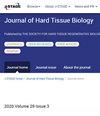Epithelial Cell Differentiation from Human Induced Pluripotent Stem Cells Using a Single-Cell Culture Method
IF 0.4
4区 医学
Q4 ENGINEERING, BIOMEDICAL
引用次数: 0
Abstract
: The conventional culture method of human induced pluripotent stem cells (hiPSCs) has been performed in colony cultures using feeder cells, such as mouse embryonic fibroblasts, which require setup times and procedural complexity, a potential risk of transmission of animal pathogens. Besides, the colony culture exhibits slow growth rate and often give rise to heterogeneous cellular states. However, developing technical methodologies of hiPSCs remains pivotal for use in medical applications and research. Here, we investigated whether hiPSCs passaged and expanded as single cells under feeder-free conditions could differentiate into ectodermal-epithelial cells as a source of cells for future regenerative medicine research. First, an hiPSC line 253G1 was cultured in colonies maintained on feeders and subsequently transferred to a single cell on feeder-free. hiPSCs were then cultured as single cells for 28 days in an induction medium supplemented with retinoic acid, bone morphogenetic protein 4, and N2 supplement for epithelial cell differentiation. The expression of epithelial markers, tumor protein p63 (P63), cytokeratin (CK) 18, and CK14 in induced cells was evaluated over time using real-time polymerase chain reaction, western blotting, and immunocytochemistry. Results showed that hiPSCs cultured as single cells ex pressed pluripotency markers, as evidenced by colony cultures maintained on feeders. On day 7 post-induction, hiPSCs as-sumed a cobblestone-like morphology in the epithelial induction medium. Induced cells displayed increased mRNA expression levels of CK18 , P63 , and CK14 during the 28-day induction period. Furthermore, the expression levels of CK18, P63, and CK14 were detected via western blotting and immunocytochemistry. Our findings suggest that hiPSCs cultured as single cells could be differentiated into epithelial cells.利用单细胞培养方法从人诱导多能干细胞分化上皮细胞
人类诱导多能干细胞(hiPSCs)的传统培养方法已在使用饲养细胞(如小鼠胚胎成纤维细胞)的集落培养中进行,这需要设置时间和程序复杂性,并且存在传播动物病原体的潜在风险。此外,菌落培养的生长速度较慢,经常产生异质细胞状态。然而,开发hipsc的技术方法仍然是医学应用和研究的关键。在这里,我们研究了hiPSCs在无饲料条件下作为单细胞传代和扩增是否可以分化为外胚层上皮细胞,作为未来再生医学研究的细胞来源。首先,将hiPSC细胞系253G1培养在喂食器维持的菌落中,随后转移到无喂食器的单细胞中。然后将hipsc作为单细胞在添加维甲酸、骨形态发生蛋白4和补充上皮细胞分化的N2的诱导培养基中培养28天。上皮标志物、肿瘤蛋白p63 (p63)、细胞角蛋白(CK) 18和CK14在诱导细胞中的表达随着时间的推移通过实时聚合酶链反应、western blotting和免疫细胞化学进行评估。结果表明,作为单细胞培养的hipsc表达多能性标记物,这一点在喂食器上的菌落培养中得到了证实。诱导后第7天,hiPSCs在上皮诱导培养基中呈现鹅卵石样形态。在28天的诱导期内,诱导细胞显示出CK18、P63和CK14 mRNA表达水平升高。此外,通过western blotting和免疫细胞化学检测CK18、P63和CK14的表达水平。我们的研究结果表明,hiPSCs作为单细胞培养可以分化为上皮细胞。
本文章由计算机程序翻译,如有差异,请以英文原文为准。
求助全文
约1分钟内获得全文
求助全文
来源期刊

Journal of Hard Tissue Biology
ENGINEERING, BIOMEDICAL-
CiteScore
0.90
自引率
0.00%
发文量
28
审稿时长
6-12 weeks
期刊介绍:
Information not localized
 求助内容:
求助内容: 应助结果提醒方式:
应助结果提醒方式:


